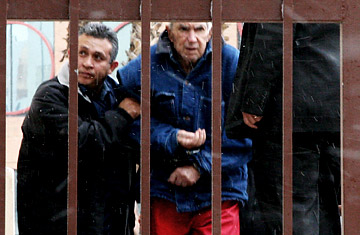
Anti-Castro militant Luis Posada Carriles is led by Federal US Marshals into the Texas Western District Court, 2007, in El Paso, Texas.
Ever since Luis Posada Carriles was smuggled into the U.S. three years ago, he's become an international poster boy for double standards in the war on terror. But a federal appeals court may now prompt the Bush Administration to follow its own post-9/11 principles.
When Posada was detained after sneaking into the United States from Mexico in 2005, the U.S. could have extradited him to Venezuela to face charges in the 1976 bombing of a Cuban jetliner that killed all 73 persons aboard. He denies involvement, but declassified FBI documents implicate him in the crime. (A questionable military trial in Venezuela had acquitted Posada of the bombing charge and he was in jail awaiting a civilian retrial when he escaped from that country in 1985.) This time, federal prosecutors opted to try him on charges of lying about how he got into the U.S. Even so, Posada was released last year after a federal judge in El Paso, Texas, dismissed his case in part because of poor translation during Posada's interview with immigration officials. The decision left many legal experts shaking their heads.
Since then, the 80-year-old Cuban exile has lived with relatives in Miami, a free man — prompting critics to call it hypocritical for the U.S. to give Posada a pass while sentencing Osama bin Laden's driver, Salim Ahmed Hamden, to 66 months in prison this month for providing material support to al-Qaeda. "By any reasonable definition, [Posada] is a terrorist," says Dennis Jett, a former U.S. ambassador to Peru and now a professor at Pennsylvania State University's international affairs school. "He may not be a threat to the U.S., but he is to the people he's [allegedly] been attacking."
Last week, however, the U.S. 5th Circuit Court of Appeals rescinded Posada's go-free card, reversing the El Paso judge's ruling. Now the anti-Castro militant, who has also been linked to 1997 bombings of tourist sites in Cuba that killed an Italian man (a charge he later denied), could be facing life behind bars again — if, that is, the Bush Administration hauls him back into detention and continues to pursue its immigration case. It's unclear whether the Texas court will reinstate his bond, and Posada's Miami attorney, Arturo V. Hernandez, says he'll appeal the latest court ruling all the way to the U.S. Supreme Court if necessary. Hernandez says that during his client's detention in El Paso, part of it in isolation, Posada dropped a lot of weight and "has not been in great health. He's being treated for a number of medical issues that one would expect in [an elderly] male who hasn't exactly had a tranquil life."
Posada's life does read like a tropical spy novel. Though he maintains Venezuelan citizenship, he has worked often with the U.S. since Fidel Castro took power in Cuba in 1959, serving in the Army and then assisting the CIA in adventures like the Bay of Pigs invasion in 1961 and the Iran-Contra operation under President Reagan. In 1990, gunmen believed to be Cuban agents shot him several times in the face and torso in Guatemala but failed to kill him. Through it all, as recently declassified FBI and CIA documents indicate, he has been accused of taking part in terrorist activities like the 1976 Cuban airline bombing and a conspiracy to assassinate Castro in Panama in 2000. Posada and three other men were convicted and imprisoned for the assassination plot, but were pardoned in 2005 by then Panamanian President Mireya Moscoso.
This summer, Panama's Supreme Court overturned that pardon, and Panamanian officials must now decide whether to seek Posada's extradition from the U.S. If they do, it would be hard for the U.S. to ignore international opinion and not hand him over. Given the bitter relations between Washington and Havana, it would simply look as though the Bush Administration were ignoring its own uncompromising anti-terrorist tenets in order to spite Castro. A U.S. immigration judge ruled that Posada would likely be tortured if he is sent to Venezuela — which is ruled by the pro-Castro government of left-wing President Hugo Chavez; that argument, however, can hardly be made with regard to Panama. (Chavez has insisted his government would never mistreat Posada.)
Others feel the federal appeals court should have gone even further and reprimanded the Administration for treating Posada like an immigration scofflaw instead of a man widely considered an international terrorist. "I worry that these cases... have the tendency to make very bad law," says Miami attorney and immigration law expert Ira Kurzban. The U.S., he insists, shouldn't be "willing to tolerate terrorists as long as they are your friends."
(For its part, the Bush Administration suggests that the Venezuelan government is hardly in a position to lecture the U.S. about double standards given Chavez's own unabashed support of Colombia's Marxist FARC guerrillas, which both Washington and the European Union have designated as terrorists. Though Chavez denies it, laptop computers seized from FARC commanders indicate Chavez has given the rebels, best known today for their kidnapping and drug-trafficking activities, significant political and financial aid.)
Either way, Posada remains in Miami keeping a low profile. Occasionally his critics will demonstrate against him on the streets of Little Havana, sometimes leading to verbal confrontations with his supporters. But that noise dies down fairly quickly. After last week's ruling, however, Posada may find himself once again leaving Miami for the legal maelstrom.
